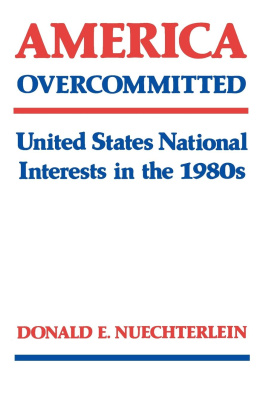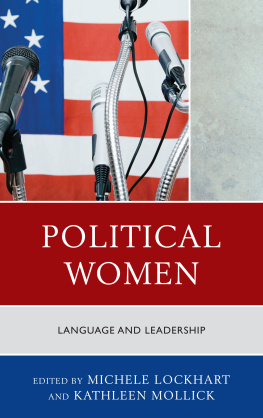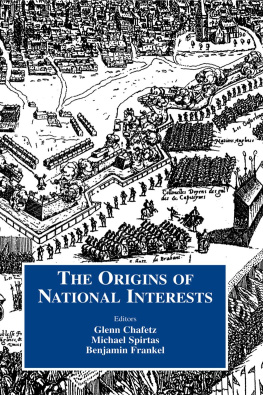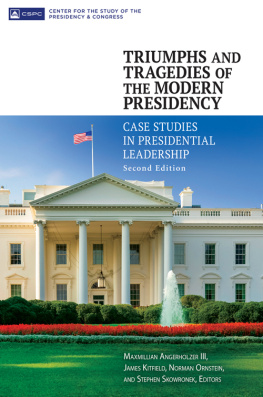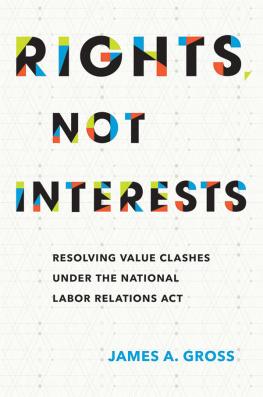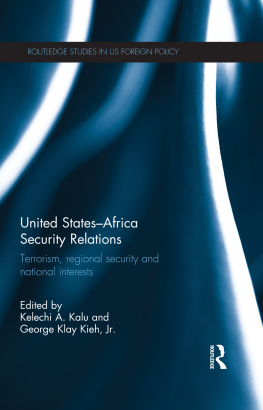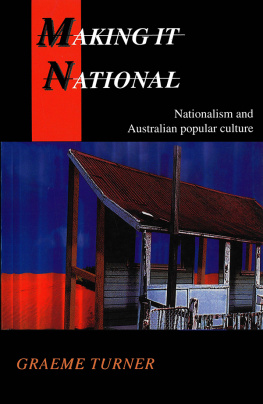Other Titles in This Series
Presidentsy Secretaries of State, and Crises in U.S. Foreign Relations: A Model and Predictive Analysis, Lawrence Falkowski
U.S. Policy in International Institutions: Defining Reasonable Options in an Unreasonable World, edited by Seymour M. Finger and Joseph R. Harbert
Congress and Arms Control, edited by Alan Platt and Lawrence D. Weiler
U.S.-Japan Relations and the Security of East Asia: The Next Decade, edited by Franklin B. Weinstein
Communist Indochina and U.S. Foreign Policy: Forging New Relations, Joseph J. Zasloff and MacAlister Brown
Crisis Resolution: Presidential Decision Making in the Mayaguez and Korean Confrontations, Richard G. Head, Frisco W. Short, and Robert C. McFarlane
Westview Special Studies in International Relations
National Interests and Presidential Leadership: The Setting of Priorities
Donald E. Nuechterlein
Many scholars have ignored the concept of national interest simply because no logical, systematic means of dealing with this key aspect of international politics has been available. A new approach to defining national interest forms the basis for this study of presidential decisions on U.S. involvement in foreign wars. Professor Nuechterlein looks at various crisis situations to determine what defense, economic, world order, and ideological interests are at stake; he identifies sixteen cost/risk and value factors that affect the U.S. view of which interest is most vital in a given situation. In any dispute, it is the interest that is considered vitaltoo important to compromisethat is the key element in crisis decisions.
Professor Nuechterlein uses his analytical framework to examine the ways Presidents Wilson, Roosevelt, Truman, Johnson, and Nixon perceived the national interest when making their decisions to begin or extend U.S. war involvement. He assesses the value of National Security Council participation in the decision-making process and presents case-study analyses of three imminent U.S. foreign policy concernsQuebecs possible separation from Canada, the Panama Canal Treaty, and the potential for race war in South Africawith an epilogue on the challenges facing Carter. The author suggests that the most important U.S. national interest in the future will be economic, with energy conservation a top priority.
Donald E. Nuechterlein is professor of international affairs at the Federal Executive Institute in Charlottesville, Virginia. He has held posts at George Washington University and the University of Virginia, and was a Fulbright lecturer at the University College of Wales. Professor Nuechterlein is the author of numerous books and articles on international relations and U.S. foreign policy, the most recent of which, Inside the Bureaucracy: The View from the Assistant Secretarys Desk, he coauthored with Thomas P. Murphy and Ronald J. Stupak.
First published 1978 by Westview Press
Published 2018 by Routledge
52 Vanderbilt Avenue, New York, NY 10017
2 Park Square, Milton Park, Abingdon, Oxon OX14 4RN
Routledge is an imprint of the Taylor & Francis Group, an informa business
Copyright 1978 by Taylor & Francis
All rights reserved. No part of this book may be reprinted or reproduced or utilised in any form or by any electronic, mechanical, or other means, now known or hereafter invented, including photocopying and recording, or in any information storage or retrieval system, without permission in writing from the publishers.
Notice:
Product or corporate names may be trademarks or registered trademarks, and are used only for identification and explanation without intent to infringe.
Library of Congress Cataloging in Publication Data
Nuechterlein, Donald Edwin, 1925
National interests and presidential leadership.
(Westview special studies in international relations)
Includes index.
1. PresidentsUnited States. 2. United StatesForeign relations. I. Title.
JK570.N83 353.032 78-2764
ISBN 0-89158-169-3
ISBN 0-89158-170-7 pbk.
ISBN 13: 978-0-367-01759-0 (hbk)
The idea of national interest has fascinated me for much of the last decade; the more I read and think about it, the more I become convinced that scholars ought to deal with it logically and systematically instead of sweeping it under the rug, as many have done since the early postwar period. The reasons for the current neglect of national interest as a key concept in the study of international politics are threefold: (1) many scholars believe that the nation-state should not be the primary focus of the study of international relations and, hence, that the interests of states should be subordinated to the study of international organization and international integration; (2) scholars who earlier rejected the realist school of international politics because of its efforts to tie national interest to military power have found no other suitable basis for discussing the goals of states; and (S) some have decided that the term national interest is methodologically so vague and loosely defined by diplomats and military planners that it is impossible to formulate generally acceptable operational guidelines; it is useless to try to resuscitate the patient, they say, and better to let him die. In my view, such attitudes represent a cop-out on the part of political scientists. Rather than passing off a concept that has been in the vocabulary of statesmen and militarists for four hundred years, they should be making renewed efforts to define more accurately the goals, objectives, and drives of nation-states in the international system.
My interest in the concept of national interest is traceable to the Vietnam war, which forced me to seek some better way to define the goals the United States should strive for in its foreign policy. The initial outcome of this search was United States National Interests in a Changing World (1973), which sought to devise a method that would enable U.S. policymakers to make wiser judgments about what the United States should, and should not, be willing to negotiate for or fight for. That book dealt exclusively with the United States, its experience in world affairs since World War II, and its dilemma in trying to define what its aims were in Vietnam. Since then, I have broadened the framework to include a comparison of the national interests of several nation-states involved in international issues, assuming that such comparison will lead to greater understanding of the policies states have adopted in past crises and may also suggest how they might respond in future ones. The earlier study contained only one case study of how national interests influenced policy decisions: the perceptions of six presidents were assessed on the question of Vietnams importance for the United States. The present book contains more cases, covering both past conflicts in international politics and probable future crises that would affect the interests of major and superpowers.
I believe that the concept of national interest can, and should be, taken out of the bottom drawer of our file of knowledge and given a more prominent role in explaining state behavior. Integration theory and a number of other theories of international relations that have been in vogue for the past twenty years seem to be called into serious question today as the world moves into a new and more complex set of international relations, particularly between rich industrial states and the ever-increasing number of poor and undeveloped states. To explain why the Arab states imposed an oil embargo on the United States in 1973and why the United States permitted them to do so without serious retaliationrequires a meaningful conceptual framework that takes account of the basic aspirations of the Arab nations as well as those of the United States. It should also be able to explain why this episode led not to waras surely would have happened twenty years agobut to negotiations in which the United States, in fact, capitulated to the weaker Arab states. By focusing on the values that serve as the underpinnings of state aspirations and by weighing them against the costs and risks that are inherent in the use of force or strong economic retaliation, I believe it is possible to ascertain with some accuracy the intensity with which nation-states will view specific threats to their security, economic well-being, and sense of justice (basic interests). It should, therefore, be possible to suggest the probable courses of action they will follow when these interests are at stake.



